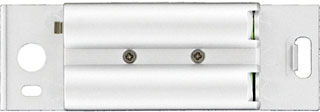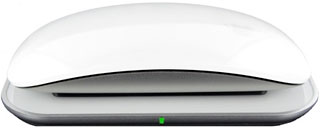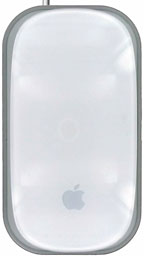MacBook, PowerBook, iBook, and other portable computing is covered
in The 'Book Review. iPad, iPod,
iPhone, and Apple TV news is covered in The
iNews Review.
All prices are in US dollars unless otherwise noted.
News & Opinion
Products & Services
Software
News & Opinion
Spaces Hijacking Keyboard Input in Leopard and Snow
Leopard
MacFixIt's Topher Kessler says that while convenient, there may be
times when OS X's Spaces multiple desktop environment feature will
capture keyboard input for use when moving between spaces - and then
not release the keyboard input. As a result, the system passes all
keyboard input to Spaces, so only Spaces-related functions work, such
as switching between desktops or viewing all Spaces onscreen, although
the system is not frozen.
I've experienced this problem incessantly with Snow Leopard on my
MacBook, rarely if ever in Leopard (I have both OS version installed on
separate partitions). I've blogged about it several times, and some of
the feedback has suggested that I must either have a hardware problem
or a corrupted install of Snow Leopard, even though I clean installed
it on a previously unwritten hard drive partition. However, it appears
that the issue, while not afflicting everyone (light or nonusers of
Spaces might never encounter it, for example)
Topher Kessler suggests a number of potential workarounds and fixes.
The one I've found works best for me is a little AppleScript called
QuitDock, based on a 2002 Mac Net Journal site tutorial by Rob
McNair-Huff, with instructions on how to implement easy Dock restarting
with one click, enlisting the help of a simple AppleScript.
You just have to create a very simple AppleScript using OS X's
bundled ScriptEditor utility (Applications > AppleScript > Script
Editor), save it as an OS X applet and drop it it in the Scripts folder
(Scripts menulet > Open Scripts Folder or drag it to either
HardDrive > Library > Scripts or HardDrive > Users:username
> Library > Scripts ) where it can be accessed when you need to
quit and restart the Dock. Rob McNair-Huff's Mac Net Journal tutorial,
Restart Your Dock with AppleScript,
has all the information you need to do this yourself.
As Kessler notes, you can also use Activity Monitor to select and
force-quit the Dock, but that's a lot more cumbersome than running a
little AppleScript from the Scripts menu.
There are quite a few other approaches cited in the MacFixIt
piece.
Link: Spaces
Grabbing Keyboard Input in Leopard or Snow Leopard
Bad News: Today's Personal Computers Are Built to
Last
MarketWatch's John Dvorak says that the irony of the PC business
these days is that the current architecture and quality make personal
computers last longer than ever, approaching the longevity of
automobiles. Dvorak says his household has vehicles that are all over
10 years old and not worth upgrading, but they work fine and seem to
have a long life ahead of them. That would apply to my family's fleet
of rolling stock as well, the newest unit being a 2000 model, and we
still have '90 and '91 Toyotas in service as daily drivers.
And as Dvorak observes, this state of affairs is not conducive to
any sort of sector recovery in the US or elsewhere, because for the
most part - except for adding some hard disk capacity - there is
usually no compelling reason to upgrade your computer system unless it
is failing electronically.
I do have a 19 month old MacBook, but I'm typing this blog on a
10-year-old Pismo
PowerBook that I intend on using as a utility machine for as long
as it works - or until OS X
10.4 Tiger gets intractably obsolete. It's slower than my Core 2 Duo MacBook, but for a
lot of the stuff I do with computers, there isn't a whole lot of
aggravation involved.
Publisher's note: Bad news? I don't think so. The Low End Mac
philosophy, which we've been preaching since 1997, is that there's a
lot of life in most old Macs. They may requires more system memory, a
bigger hard drive, or a newer version of the Mac OS than they shipped
with, but they can almost always be more capable than when they were
new. We live this philosophy at LEM headquarters - primarily because we
don't have the money for new hardware. I work on two dual-processor G4
Power Macs daily, a 2002 dual
1 GHz Mirrored Drive Doors running Tiger and Classic Mode and a
dual 1.6 GHz
(upgraded) 2001
Digital Audio running Leopard. Both were acquired used, have bigger
and faster hard drives installed, and have maximum (or near maximum)
RAM installed.
I would love to have flat panel displays, maybe a 20" iMac G5 for
Tiger/Classic, and a 2009 Mac mini (the last version to support
Leopard), but what we have works, so until the economy revives and we
have surplus funds, I'll be sticking with this as long as it continues
to work. dk
Link:
Bad News: PCs are Built to Last
10 Rules of the Cheap Revolution
Forbes' Rich Karlgaard says there is a dynamic in play in the world
economy that began unnoticed in the 1950s with two concepts: scientific
description of DNA's double-helix structure and invention of the
integrated circuit. These two innovations enabled companies to double
their capabilities every two years or so, thereby radically changing
the relationship between power and value - a phenomenon he calls "the
Cheap Revolution."
Prior to that, Karlgaard observes that technological progress and
wealth creation proceeded at a glacial pace, noting that the vast
majority of people lived no better in AD 1300 than they did in 1300 BC.
Things sped up with the Renaissance, followed by the first Industrial
Revolution (i.e.: steam power), which was rapidly - in historical terms
- followed by the second Industrial Revolution in the late 19th century
which brought the internal combustion engine, electricity and
telephony, efficient manufacturing, affordable cars, highway networks,
and mass communication and marketing.
However, these developments caused a lot of collateral damage, as
their benefits have been spread unevenly, with casualties including
poor manual farmhands, employees of companies that sell overpriced
products and services in a Cheap Revolution world, and, most recently,
homebuilders, brick and mortar booksellers, and autoworkers.
Karlgaard notes that thanks to the Cheap Revolution a company like
Apple can sell you a new iPod, iPhone, iPad, and a MacBook for less
than $2,500, which is, he recalls, precisely what he paid in 1985 for
his first Mac, with
its small black-and-white screen, 512 KB of memory, and no hard
drive.
Karlgaard proposes ten Cheap Revolution rules that help sort present
and future winners from losers, all ten of which are positive to a
greater or lesser extent for Apple.
- Consumers rule.
- Solid-state rules.
- Interface rules.
- Transparency rules.
- Detail rules.
- Smart-aggregation rules.
- Dumb-aggregation rules.
- Speed rules.
- Self-learning rules.
- Self-discipline rules.
Link: Ten Rules of the
Cheap Revolution
The Curse of 3D TV
Technologizer's Harry McCracken says:
"Tech makers think three dimensions are the next big thing after HD
. . . I hope not . . . at the IFA tech show here in
Berlin based on raw square footage in the booths 3D TV is everywhere
. . . The massive booths of consumer-electronics giants such
as Sony, Samsung, Panasonic, and Toshiba are dominated by 3D
. . . All the 3D at the show had one thing in common: It's
lousy . . . Much of it was unusually blurry, some of the sets
that required glasses looked only slightly better than Fraunhofer's
no-specs technology demo. None of it rose to the level of being good,
and I came away thinking that the level of hoopla was bizarre given the
lackluster products being hyped.
"3D TV occupies so much IFA real estate because the electronics
industry thinks that teeming masses of people are going to be willing
to buy new TVs and don uncomfortable, expensive glasses in order to
watch three-dimensional content. I think consumers are smarter than
that. I think will prove to be a fad or, at least, a mistake...."
Editor's note: I couldn't agree more on this point. The 3D idiocy
appears to have the potential to ruin movies, TV, and computers if this
bandwagon continues to accelerate. As McCracken notes, "as a medium, 3D
remains remarkably self-trivializing." It's a gimmick, and IMHO a
particularly annoying and irritating one. Thus is one technological fad
that deserves to die a quick death. cm
Link: The Curse of 3D TV
Products & Services
Magic Charger Wireless Charger for Magic Mouse
 PR: Switzerland-based Mobee's Magic Charger wireless
induction charger for Magic Mouse, touted as a "greener way" to use
your Magic Mouse, consists of a USB-powered base station and a special
battery pack that fits into Apple's Magic Mouse in place of standard
alkaline or rechargeable cells. At 1.3 ounces, the Mobee pack even
weighs a bit less than a pair of AA batteries.
PR: Switzerland-based Mobee's Magic Charger wireless
induction charger for Magic Mouse, touted as a "greener way" to use
your Magic Mouse, consists of a USB-powered base station and a special
battery pack that fits into Apple's Magic Mouse in place of standard
alkaline or rechargeable cells. At 1.3 ounces, the Mobee pack even
weighs a bit less than a pair of AA batteries.
 To charge the battery pack, just park the mouse on the base
station, and a blue light will indicate that it's charging. After
reaching full charge in about six hours (battery life is nominally 50
charge cycles), the battery is claimed to provide six days runtime in
average use.
To charge the battery pack, just park the mouse on the base
station, and a blue light will indicate that it's charging. After
reaching full charge in about six hours (battery life is nominally 50
charge cycles), the battery is claimed to provide six days runtime in
average use.
Intended for for home, travel, and office use, the Magic Charger is
made of recyclable materials and is projected to ship in mid-October
priced at around $50. Mobee will begin taking preorders on September
15.
 Specifications
Specifications
- Base Station Size: 4.64" x 2.55" x 0.35" / 118 mm x 65 mm x 9
mm
- Base Station Weight: 1.94 oz / 55 g
- Replacement Battery Weight: 1.30 oz / 37 g
- Runtime: 6 days
- Full Charge Time: 6 hours
- Power Consumption on USB: 270 mAh Max.
- Battery Life: 500 Cycles
- Cable Length: 43.3 in / 110 cm
- Warranty: One Year
Link: Mobee Magic
Charger - removed as a malware link
Software
Stellar Launches Stellar Drive ToolBox for Mac
PR: Stellar Information Systems Limited announces the release
of Stellar Drive ToolBox, which is an ultimate utility to optimize the
performance of your Mac hard drive. Stellar Drive ToolBox is an
'All-in-One' pre-crash Mac hardware maintenance utility that
effectively optimizes, protects, manages, repairs, and sanitizes your
Mac hard drive volumes.
The Software is a combination of 13 indispensable Mac hard drive
maintenance and management tools, Stellar Drive ToolBox protects your
Mac hard drive from various impending hardware issues. The 13 powerful
modules include
- Surface Scan
- Drive Initialization
- Benchmark
- Drive Performance
- Volume Repair
- Crap Remover
- Drive Stats
- Free Space Optimizer
- Manage Volume
- Stellar Shield
- Raw Data Editor
- Wipe
- Drive Clone
"Stellar Drive ToolBox offers Mac users a smarter way to manage and
maintain their Mac hard drives and act as a 'Safeguard' against any
impending hard drive issue leading to Mac hard drive crash. We are much
ambitious about our new launch and trust that Stellar Drive ToolBox
will prove much helpful for all Mac users to manage, maintain, and
optimize their Mac hard drives," says Sunil Chandna, CEO of Stellar
Information Systems Ltd.
Stellar Drive ToolBox Features
- Initializes the Mac hard drive
- Optimizes the free space in the hard drive volume
- Manage volumes, such as 'Create Volume', 'Delete Volume', and
'Resize Volume'
- Option to clone the Mac hard drive
- The 'Stellar Shield' allows to restore deleted files/folders
- Updates the SMART status of your Mac hard drive
- Enables rectifying minor error using the 'Raw Data Editor'
- Wipes off unwanted data from the hard drive
Stellar Drive ToolBox is available in both the CD and Download
versions for=
Single Home User, Administrators, and Technicians. The Single Home
User edition is available at $99.
Link: Stellar
Drive ToolBox
OCRKit: Fast and Simple Text Recognition for Mac OS
X
PR: ExactCODE continues to improve OCRKit, and bring
streamlined and easy to use text recognition to the Mac. OCRKit
recognizes text from images and PDF documents and transform them into
searchable PDFs by using advanced Optical Character Recognition
technology. The latest OCRKit update 1.5 allows to save HTML and RTF
formats and TXT UTF-8 encoded plain text. In addition it improves the
recognition and stability of OCRKit plus the user-interface
translations got updated.
OCRKit comes as a native, Intel Macintosh application focusing on
usability and simple to use. By dragging a document onto the
application icon a searchable and multi page PDF is quickly created.
OCRKit helps to organize the office workflow: By making received
information, in image or PDF form, from a copier, scanner, receipt or
via e-mail editable and indexable to find them with Spotlight or manage
them in a database application.
OCRKit comes with support for many OCR languages, including English,
Dutch, French, German, Italian, Portuguese, Spanish and Swedish, and
even more user-interface translations: English, Dutch, German, Italian,
Japanese, Portuguese, Spanish, Simplified-Chinese, Traditional-Chinese,
and works with Apple Mac OS X 10.4, 10.5 as well as with the 'Snow
Leopard' version 10.6. on Intel Macs. The support of AppleScript allows
professionals to create dedicated solutions for specific and even
difficult workflows.
What's new in OCRKit 1.5?
- added support to save HTML (Hyper Text Markup Language) format
- added support to save RTF (Rich Text Format) format
- added support to save TXT UTF-8 encoded plain text
- improved recognition and stability
- updated user-interface translations
- many other improvements
Other features of OCRKit:
- Streamlined and easy OCR for Mac OS X
- As simple as drag and drop files to the application iconCan read
existing PDFs and many popular raster image formats, including TIFF,
JPEG, JPEG2000, BMP, PNM and more
- Creates Portable Document Files (PDF), virtually readable
everywhere
- Powerful automatic image filters, as well as optional
de-screen
- Rotate documents on-the-fly
- No limits, neither on the daily processing volume, nor pages per
document
OCRKit is available for the special introductory price of €
39 or $49 till end of September. Thereafter it will be available for
€49 or $59 online, and several distributors and resellers
worldwide.
Link: OCRKit
Desktop Mac Deals
For deals on current and discontinued 'Books, see our 13" MacBook and MacBook Pro,
MacBook Air, 13" MacBook Pro, 15" MacBook Pro, 17" MacBook Pro, 12" PowerBook G4, 15" PowerBook G4, 17" PowerBook G4, titanium PowerBook G4,
iBook G4, PowerBook G3, and iBook G3 deals.
We also track iPad,
iPhone, iPod touch, iPod classic, iPod nano, and iPod shuffle deals.

 PR: Switzerland-based Mobee's Magic Charger wireless
induction charger for Magic Mouse, touted as a "greener way" to use
your Magic Mouse, consists of a USB-powered base station and a special
battery pack that fits into Apple's Magic Mouse in place of standard
alkaline or rechargeable cells. At 1.3 ounces, the Mobee pack even
weighs a bit less than a pair of AA batteries.
PR: Switzerland-based Mobee's Magic Charger wireless
induction charger for Magic Mouse, touted as a "greener way" to use
your Magic Mouse, consists of a USB-powered base station and a special
battery pack that fits into Apple's Magic Mouse in place of standard
alkaline or rechargeable cells. At 1.3 ounces, the Mobee pack even
weighs a bit less than a pair of AA batteries. To charge the battery pack, just park the mouse on the base
station, and a blue light will indicate that it's charging. After
reaching full charge in about six hours (battery life is nominally 50
charge cycles), the battery is claimed to provide six days runtime in
average use.
To charge the battery pack, just park the mouse on the base
station, and a blue light will indicate that it's charging. After
reaching full charge in about six hours (battery life is nominally 50
charge cycles), the battery is claimed to provide six days runtime in
average use. Specifications
Specifications
